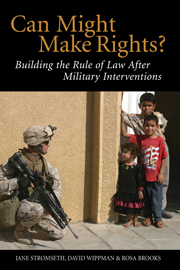Book contents
- Frontmatter
- Contents
- Acknowledgments
- 1 Introduction: A New Imperialism?
- 2 Interventions and International Law: Legality and Legitimacy
- 3 What Is the Rule of Law?: A Pragmatic Definition and a Synergistic Approach
- 4 Blueprints for Post-Conflict Governance
- 5 Security as Sine Qua Non
- 6 The Challenge of Justice System Reform
- 7 Accountability for Atrocities: Moving Forward by Looking Backward?
- 8 Creating Rule of Law Cultures
- 9 Enhancing Rule of Law Efforts: Planning, Funding, and Local Ownership
- 10 Conclusion
- Index
7 - Accountability for Atrocities: Moving Forward by Looking Backward?
Published online by Cambridge University Press: 05 June 2012
- Frontmatter
- Contents
- Acknowledgments
- 1 Introduction: A New Imperialism?
- 2 Interventions and International Law: Legality and Legitimacy
- 3 What Is the Rule of Law?: A Pragmatic Definition and a Synergistic Approach
- 4 Blueprints for Post-Conflict Governance
- 5 Security as Sine Qua Non
- 6 The Challenge of Justice System Reform
- 7 Accountability for Atrocities: Moving Forward by Looking Backward?
- 8 Creating Rule of Law Cultures
- 9 Enhancing Rule of Law Efforts: Planning, Funding, and Local Ownership
- 10 Conclusion
- Index
Summary
Atrocities cast a long shadow. In post-intervention societies, reestablishing security, reconstructing governance institutions, and reforming the justice system are all crucial steps in promoting the rule of law, but important as they are, they are rarely sufficient to grapple with the legacy of past abuses. In most of the post-conflict societies discussed in this book, severe abuses were widespread in the period prior to intervention. The Balkan wars, for instance, were characterized by brutal massacres, mass rapes, and ethnic cleansing. Sierra Leone's civil war was characterized by the forced recruitment of child soldiers, widespread rapes and murders, and the gruesome mutilation of civilians. Afghanistan, Iraq, and East Timor also have had bloody pasts marked by severe abuses.
In such societies, the traumatization caused by widespread past atrocities does not end when the guns fall silent. Although nothing can undo the suffering caused by atrocities, ensuring that perpetrators face some reckoning may be critical to moving forward in countries recovering from violent conflict. Ensuring accountability may help victims move on and can also help signal to all members of post-conflict societies that, henceforth, such abuses will not be permitted to recur. Just as important, the process of ensuring accountability may, in some circumstances, reinforce broader efforts to reform the justice system.
As with every challenge discussed in this book, however, “ensuring accountability” is more easily said than done.
Information
- Type
- Chapter
- Information
- Can Might Make Rights?Building the Rule of Law after Military Interventions, pp. 249 - 309Publisher: Cambridge University PressPrint publication year: 2006
Accessibility standard: Unknown
Why this information is here
This section outlines the accessibility features of this content - including support for screen readers, full keyboard navigation and high-contrast display options. This may not be relevant for you.Accessibility Information
- 2
- Cited by
